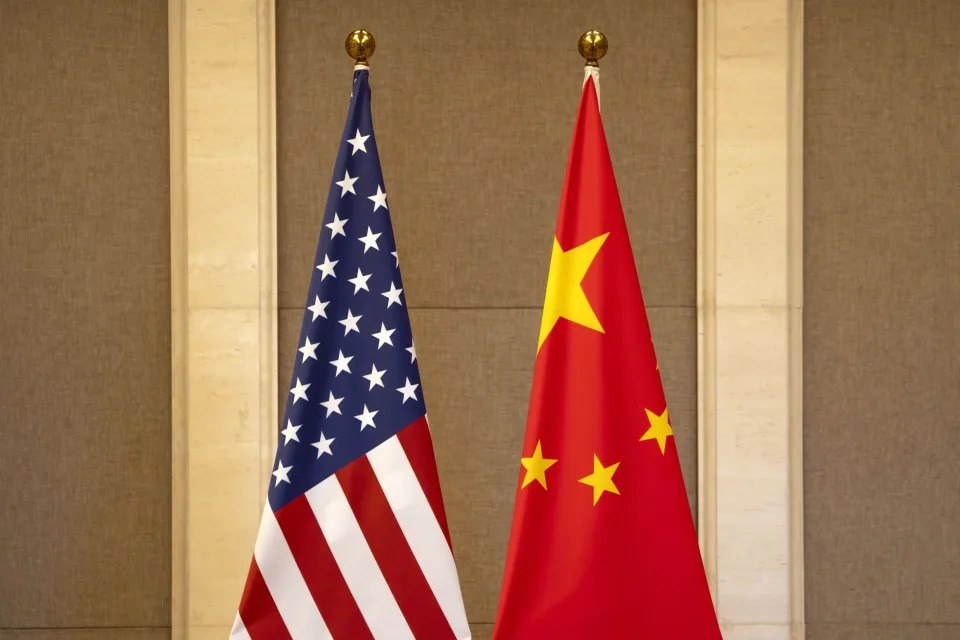Chinese businesses hoping to expand in the US and bring jobs face uncertainty and suspicion

It was billed as the “biggest ever economic development project” in north Michigan when Gov. Gretchen Whitmer in 2022 welcomed a Chinese lithium-ion battery company’s plan to build a $2.36 billion factory and bring a couple thousand jobs to Big Rapids.
But now the project by Gotion High-Tech is in the crosshairs of some U.S. lawmakers and local residents.
Leading the charge is Republican Rep. John Moolenaar of Michigan, chairman of the House Select Committee on China, who accuses the Chinese company of having ties to forced labor and says he fears it could spy for Beijing and work to extend China's influence in the U.S. heartland. Gotion rejects the accusations.
“I want to see this area have more jobs and investments, but we must not welcome companies that are controlled by people who see us as the enemy and we should not allow them to build here,” Moolenaar said at a recent roundtable discussion in Michigan.
Lured by the large U.S. market, Chinese businesses are coming to the United States with money, jobs and technology, only to find rising suspicion at a time of an intensifying U.S.-China rivalry that has spread into the business world.
U.S. wariness of China, coupled with Beijing's desire to protect its technological competitiveness, threatens to rupture ties between the world's two largest economies. That could hurt businesses, workers and consumers, which some warn could undermine the economic foundation that has helped stabilize relations.
“This is a lose-lose scenario for the two countries,” Zhiqun Zhu, professor of political science and international relations at Bucknell University, said in an email. “The main reason is U.S.-China rivalry, and the U.S. government prioritizes ‘national security’ over economic interests in dealing with China.”
Lizhi Liu, an assistant professor of business at Georgetown University, said the trend, along with the decline of U.S. investments in China, could hurt China-U.S. relations.
“Strong investment ties between the two nations are crucial not only for economic reasons but also for security, as intertwined economic interests reduce the likelihood of major conflicts or even war,” she said.
AfriPrime App link: FREE to download...
https://www.amazon.com/Africircle-AfriPrime/dp/B0D2M3F2JT
But U.S. lawmakers believe the stakes are high. Sen. Marco Rubio said at a July hearing that China is not only a military and diplomatic adversary for the U.S. but also a “technological, industrial and commercial” opponent.
“The technological and industrial high ground has always been a precursor of global power,” said Rubio, a Republican from Florida. He argued that U.S. foreign policy should take into account the country's commercial, trade and technological interests.
The bipartisan House Select Committee on China has warned that widespread adoption in the US. of technologies developed by China could threaten long-term U.S. technological competitiveness.
U.S. public sentiment against Chinese investments began to build up during President Barack Obama's administration, in a pushback against globalization, and were amplified after President Donald Trump came into office, said Yilang Feng, an assistant professor of business at University of Illinois at Urbana-Champaign, who studies economic nationalism and resistance to foreign direct investments in the U.S.
“The scale has increased, so has the intensity,” Feng said.
As President Joe Biden's administration seeks to revive American manufacturing and boost U.S. technological capabilities, many politicians believe Chinese companies should be kept out.
“Can you imagine working for an American company working tirelessly to develop battery technology and then you find out that your tax dollars are being used to subsidize a competitor from China?” Moolenaar said as he campaigned against the Gotion project in his congressional district in a state that is critical in the presidential election.
Whitmer's office has declined to comment on the project. The Michigan Economic Development Corporation told The Associated Press it has received “bipartisan support at all levels” to move forward with the project, which will create up to 2,350 jobs.
Danielle Emerson, spokesperson for MEDC, said the project is "critical to onshore the battery supply chain and create thousands of good-paying local jobs, which reduces our reliance on overseas disruptions and further protects our national security.”
Local residents of Green Charter Township, however, revolted against the project over its Chinese connections last year when they removed five officials who supported it in a recall election.
Also in Michigan, a partnership between Ford and CATL, another Chinese battery manufacturer, has been scaled back, following pushback over CATL's potential connections to China's ruling party.
In Worcester, Massachusetts, the Chinese biotech company WuXi Biologics paused construction of a large facility a few weeks after lawmakers introduced a bill that would, over data security concerns, ban U.S. entities receiving federal funds from doing business with a number of China-linked companies, WuXi Biologics included.
John Ling, who has helped South Carolina and Georgia attract Chinese businesses for nearly two decades, said geopolitics have been getting in the way in recent years. Chinese companies are less likely to consider South Carolina after the state senate last year approved a bill banning Chinese citizens from buying property, even though the bill has yet to clear the statehouse, Ling said.
Data by the U.S. Bureau of Economic Analysis show the total investments by China in the U.S. fell to just under $44 billion in 2023, from a high point of $63 billion in 2017, although first-year expenditures rose to $621 million in 2023, up from $531 million in 2022 but drastically down from the high of $27 billion in 2016. The figures include acquisitions, new business establishments and expansions.
Thilo Hanemann, a partner at the research provider Rhodium Group, said there's been an upswing in new Chinese investments in the U.S. following a major decline, prompted by the end of disruptions during the COVID-19 pandemic and the need for Chinese companies to go overseas when margins at home are dwindling.
U.S. policymakers are worried that Chinese companies, beholden to the ruling Chinese Communist Party, could pose national security risks, he said, while Beijing is concerned that overseas investments could lead to Chinese technology leakage.
“Chinese companies are in between a rock and a hard place, dealing with both domestic governments in terms of not letting them go abroad and then the U.S. or host governments that have concerns," Hanemann said.
Yet, Chinese investors may still find the U.S. market appealing “due to its high consumption levels and judicial independence," said Liu of Georgetown University.
In 2022, Michigan beat out several other states in luring Gotion, according to the governor’s office. Keen to revive its manufacturing base, the state offered a package of incentives, including $175 million in grants and the approval of a new zone that could save the company $540 million. Local townships approved tax abatements for Gotion to build a factory to make components for electrical vehicle batteries.
In Green Charter Township, the new board dropped support for the project and rescinded an agreement that would extend water to the factory site, only to be rebuked by a U.S. district judge.
The future of the plant remains uncertain, as Moolenaar is rallying support for his bill that would prevent Gotion from receiving federal subsidies. He has accused the company of using forced labor, after congressional staff discovered links between the company and Xinjiang Production Construction Corps., a paramilitary group sanctioned by the U.S. Commerce Department for its involvement in China's forced labor practice.
Chuck Thelen, vice president of manufacturing of Gotion North America, in recent town hall meetings called the forced labor accusations “categorically false and clearly intended to deceive.”
By allowing the Chinese company to build a plant in Michigan, it would help “onshore a technology that has been vastly leapfrogged" outside of the U.S., he said.
It doesn't amount to “a Chinese invasion,” Thelen said. “This is a global approach, an energy solution.”
AfriPrime App link: FREE to download...
- Questions and Answers
- Opinion
- Motivational and Inspiring Story
- Technology
- Live and Let live
- Focus
- Geopolitics
- Military-Arms/Equipment
- Безопасность
- Economy
- Beasts of Nations
- Machine Tools-The “Mother Industry”
- Art
- Causes
- Crafts
- Dance
- Drinks
- Film/Movie
- Fitness
- Food
- Игры
- Gardening
- Health
- Главная
- Literature
- Music
- Networking
- Другое
- Party
- Religion
- Shopping
- Sports
- Theater
- Health and Wellness
- News
- Culture


